-
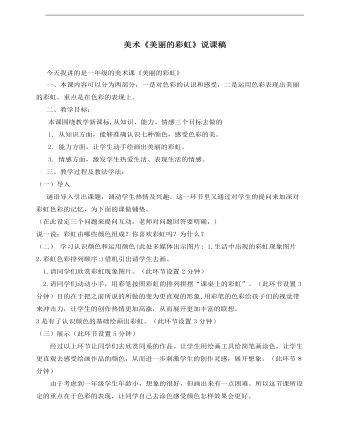
小学美术冀美版一年级上册《9天边的彩虹》说课稿
(一)导入 谜语导入引出课题,调动学生热情及兴趣。这一环节里又通过对学生的提问来加深对彩虹色彩的记忆,为下面的课做铺垫。(在此设定三个问题来提问互动,老师对问题回答要明确,)说一说:彩虹由哪些颜色组成?你喜欢彩虹吗?为什么?(二) 学习认识颜色和运用颜色(此处多媒体出示图片: 1.生活中出现的彩虹现象图片2.彩虹色彩排列顺序;)借机引出请学生去画。
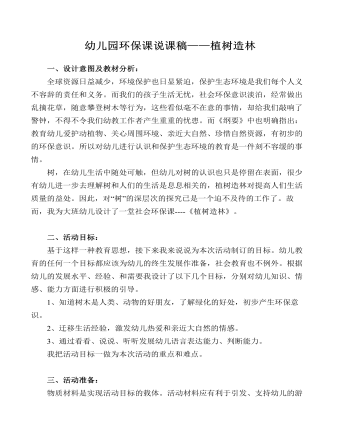
幼儿园小学说课稿教案植树造林
二、活动目标: 基于这样一种教育思想,接下来我来说说为本次活动制订的目标。幼儿教育的任何一个目标都应该为幼儿的终生发展作准备,社会教育也不例外。根据幼儿的发展水平、经验、和需要我设计了以下几个目标,分别对幼儿知识、情感、能力方面进行积极的引导。1、知道树木是人类、动物的好朋友,了解绿化的好处,初步产生环保意识。2、迁移生活经验,激发幼儿热爱和亲近大自然的情感。3、通过看看、说说、听听发展幼儿语言表达能力、判断能力。我把活动目标一做为本次活动的重点和难点。
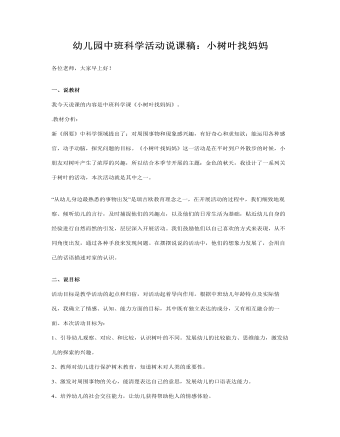
幼儿园中班科学活动说课稿:小树叶找妈妈
一、说教材我今天说课的内容是中班科学课《小树叶找妈妈》。.教材分析:新《纲要》中科学领域提出了:对周围事物和现象感兴趣,有好奇心和求知欲:能运用各种感官,动手动脑,探究问题的目标。《小树叶找妈妈》这一活动是在平时到户外散步的时候,小朋友对树叶产生了浓厚的兴趣,所以结合本季节开展的主题:金色的秋天,我设计了一系列关于树叶的活动,本次活动就是其中之一。“从幼儿身边最熟悉的事物出发”是瑞吉欧教育理念之一,在开展活动的过程中,我们细致地观察、倾听幼儿的言行,及时捕捉他们的兴趣点,以及他们的日常生活为基础,贴近幼儿自身的经验进行自然而然的引发,层层深入开展活动。我们鼓励他们以自己喜欢的方式来表现,从不同角度出发,通过各种手段来发现问题。在摆摆说说的活动中,他们的想象力发展了,会用自己的话语描述对家的认识。二、说目标活动目标是教学活动的起点和归宿,对活动起着导向作用。根据中班幼儿年龄特点及实际情况,我确立了情感、认知、能力方面的目标,其中既有独立表达的成分,又有相互融合的一面。本次活动目标为:1、引导幼儿观察、对应、和比较,认识树叶的不同。发展幼儿的比较能力、思维能力,激发幼儿的探索的兴趣。2、教师对幼儿进行保护树木教育,知道树木对人类的重要性。3、激发对周围事物的关心,能清楚表达自己的意思,发展幼儿的口语表达能力。4、培养幼儿的社会交往能力,让幼儿获得帮助他人的情感体验。难点:观察、对应、和比较,认识树叶的不同。在活动中我先让幼儿观察树叶的颜色、大小、形状等特征,然后引导幼儿运用观察、比较、对应的方法帮小树叶找妈妈,最后通过送小树叶回家,巩固对树叶特征及名称的认识。
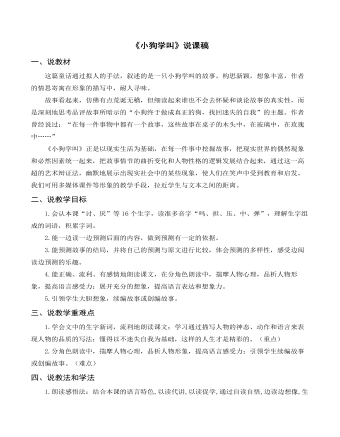
部编人教版三年级上册《小狗学叫》说课稿
一、说教材这篇童话通过拟人的手法,叙述的是一只小狗学叫的故事。构思新颖,想象丰富,作者的情思寄寓在形象的描写中,耐人寻味。 故事看起来,仿佛有点荒诞无稽,但细读起来谁也不会去怀疑和谈论故事的真实性,而是深刻地思考品评故事所暗示的“小狗终于做成真正的狗,找回迷失的自我”的主题。作者曾经说过:“在每一件事物中都有一个故事,这些故事在桌子的木头中,在玻璃中,在玫瑰中……” 《小狗学叫》正是以现实生活为基础,在每一件事中挖掘故事,把现实世界的偶然现象和必然因素统一起来,把故事情节的曲折变化和人物性格的逻辑发展结合起来,通过这一高超的艺术辩证法,幽默地展示出现实社会中的某些现象,使人们在笑声中受到教育和启发。我们可用多媒体课件等形象的教学手段,拉近学生与文本之间的距离。
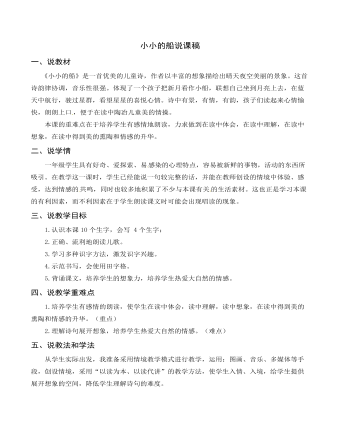
《小小的船》说课稿
学生在朗读同时也在接受美的熏陶。在教学中,我始终重视让“趣”字贯穿整个教学过程,在读读、想想、说说中感受美,培养想象力并进行朗读训练。
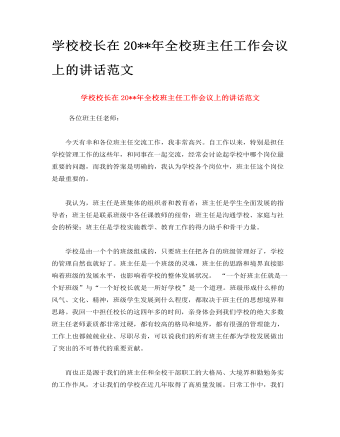
学校校长在2023年全校班主任工作会议上的讲话范文
仁爱心。没有爱就没有教育。爱是教育永恒的主题,班主任老师只有以“仁爱”为核心,尊重、关心、爱护学生,才能成为一名合格的班主任、成为一名学生喜爱的班主任。教育是塑造人心灵和灵魂的伟大事业,热爱学生应该是教师厚重的职业底色。班主任的仁爱之心体现为真诚地尊重学生,体现为相信每个学生都能够成为有用之才。当我们的班主任老师真做到有仁爱之心了,我们就能从心底喜欢和认可我们的每一个学生,我们也就能得到学生更大的爱戴和信服,也就能达成“亲其师,信其道”的效果,在我们开展教育活动的时候,就能更好地走进学生的心灵深处,就会更加平和、有效。我们学校很多班主任、老师深受学校爱戴,分析这些班主任和老师就不难发现,仁爱心是这些老师身上共有的特点之一。
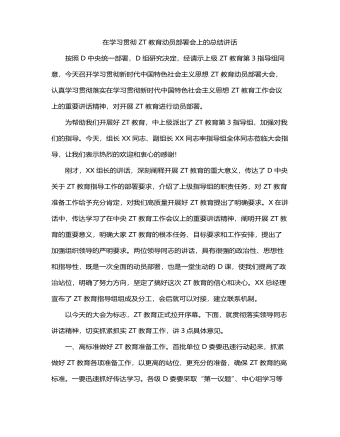
在学习贯彻主题教育动员部署会上的总结讲话
所属单位机关部门D组织ZT教育可以适当错后启动,拉开时间梯次,但也不能与上级单位间隔时间过长,最晚5月5日前要全面启动。需要强调的是,不管什么时间启动,具体到每个单位、部门,开展ZT教育的时间都不能少于5个月。无论采取哪种方式启动,都要讲清这次ZT教育的重大意义、目标要求、工作安排等。总公司机关各部门、所属各单位、各化工公司要将启动方案报巡回指导组审阅把关,巡回指导组还要现场参加指导各部门、各单位的启动工作。三、高水平进行ZT教育督促指导。强有力的督促指导是搞好ZT教育的重要保证,要把严督实导贯穿指导开展ZT教育全过程。按照D中央要求,总公司所属各单位不再派出指导组。这对总公司巡回指导组来说,担子更重了,既要直接指导所属各单位和化工公司本级D委,又要延伸指导所属单位机关部门、直属单位D组织。
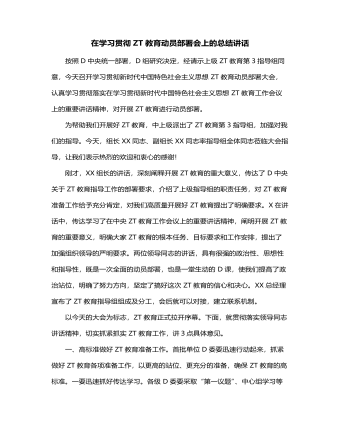
在学习贯彻主题教育动员部署会上的总结讲话
无论采取哪种方式启动,都要讲清这次ZT教育的重大意义、目标要求、工作安排等。总公司机关各部门、所属各单位、各化工公司要将启动方案报巡回指导组审阅把关,巡回指导组还要现场参加指导各部门、各单位的启动工作。三、高水平进行ZT教育督促指导。强有力的督促指导是搞好ZT教育的重要保证,要把严督实导贯穿指导开展ZT教育全过程。按照D中央要求,总公司所属各单位不再派出指导组。这对总公司巡回指导组来说,担子更重了,既要直接指导所属各单位和化工公司本级D委,又要延伸指导所属单位机关部门、直属单位D组织。要把准巡回指导工作定位,切实尊重各单位D委主体地位,紧紧依靠他们开展工作,既指出存在问题又要帮助研究对策,真正实现同题共答。

校领导在2024年XX教育工作总结表彰暨教学能力培训会上的讲话
最后,也借这个机会,向大家三点工作的要求:1.要始终秉持教学第一位的本位意识思政教育、专业教育、XX教育、知行教育、实践教育、工程教育,这些所有的模块构成了我们学校人才培养体系,大家要始终秉持教学本位的理念,深刻研判国家、社会、学校人才培养的新形势和新要求,不断探索前沿高等教育先进的教学理念和教学方法,持续推进我校教育体系的完善与创新。2.XX教育应加强团队协作XX教育建设并非闭门造车,我们在新工科新文科协同发展理念引导下,大力扶持文理渗透、理工交融的学科交叉融合,整合校内多学科资源,建立开放、共享、交叉、融合的XX教育课程体系,这已成为我们学校XX教育建设导向,所以更需要大家加强团队协作,体现产教融合科教融汇、有组织科研有组织教研的一些集中成果。3.认真践行课堂革命教学改革
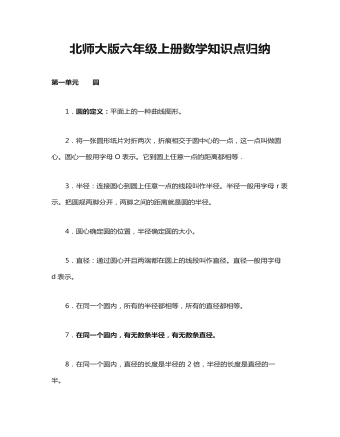
北师大版六年级上册数学知识点总结教案
第一单元 圆1.圆的定义:平面上的一种曲线图形。2.将一张圆形纸片对折两次,折痕相交于圆中心的一点,这一点叫做圆心。圆心一般用字母O表示。它到圆上任意一点的距离都相等.3.半径:连接圆心到圆上任意一点的线段叫作半径。半径一般用字母r表示。把圆规两脚分开,两脚之间的距离就是圆的半径。4.圆心确定圆的位置,半径确定圆的大小。5.直径:通过圆心并且两端都在圆上的线段叫作直径。直径一般用字母d表示。6.在同一个圆内,所有的半径都相等,所有的直径都相等。7.在同一个圆内,有无数条半径,有无数条直径。8.在同一个圆内,直径的长度是半径的2倍,半径的长度是直径的一半。用字母表示为:d=2r r =1/2d 用文字表示为:半径=直径÷2 直径=半径×2
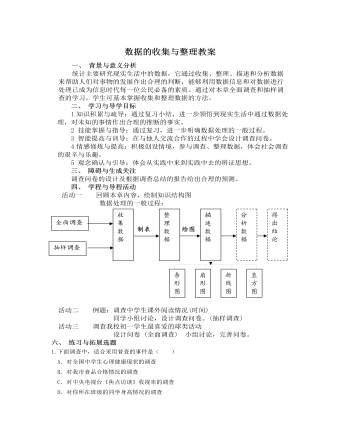
北师大初中七年级数学上册第六章复习教案
一、 背景与意义分析统计主要研究现实生活中的数据,它通过收集、整理、描述和分析数据来帮助人们对事物的发展作出合理的判断,能够利用数据信息和对数据进行处理已成为信息时代每一位公民必备的素质。通过对本章全面调查和抽样调查的学习,学生可基本掌握收集和整理数据的方法。二、 学习与导学目标1 知识积累与疏导:通过复习小结,进一步领悟到现实生活中通过数据处理,对未知的事情作出合理的推断的事实。2 技能掌握与指导:通过复习,进一步明确数据处理的一般过程。3 智能提高与训导:在与他人交流合作的过程中学会设计调查问卷。4 情感修炼与提高:积极创设情境,参与调查、整理数据,体会社会调查的艰辛与乐趣。5 观念确认与引导:体会从实践中来到实践中去的辨证思想。三、 障碍与生成关注调查问卷的设计及根据调查总结的报告给出合理的预测。四、 学程与导程活动活动一 回顾本章内容,绘制知识结构图
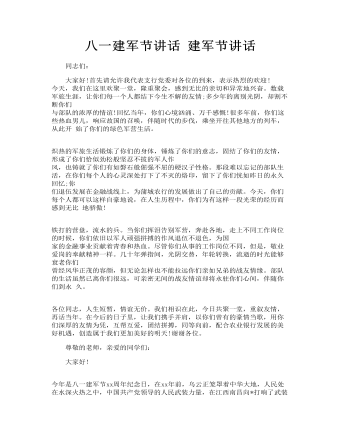
八一建军节讲话 建军节讲话
铁打的营盘,流水的兵。当你们挥泪告别军营,奔赴各地,走上不同工作岗位的时候,你们依旧以军人顽强拼搏的作风退伍不退色,为国 家的金融事业贡献着青春和热血。尽管你们从事的工作岗位不同,但是,敬业爱岗的奉献精神一样。几十年弹指间,光阴交替,年轮转换,流逝的时光能够衰老你们曾经风华正茂的容颜,但无论怎样也不能拉远你们亲如兄弟的战友情缘。部队的生活虽然已离你们很远,可亲密无间的战友情谊却将永驻你们心间,伴随你们到永 久。

新人教版高中英语必修3Unit 5 The Value of Money-Discovering Useful Structures导学案
4.They were going to find someone to take part in their bet when they saw Henry walking on the street outside.[归纳]1.过去将来时的基本构成和用法过去将来时由“would+动词原形”构成,主要表示从过去某一时间来看将要发生的动作(尤其用于宾语从句中),还可以表示过去的动作习惯或倾向。Jeff knew he would be tired the next day.He promised that he would not open the letter until 2 o'clock.She said that she wouldn't do that again.2.表示过去将来时的其他表达法(1)was/were going to+动词原形:该结构有两个主要用法,一是表示过去的打算,二是表示在过去看来有迹象表明将要发生某事。I thought it was going to rain.(2)was/were to+动词原形:主要表示过去按计划或安排要做的事情。She said she was to get married next month.(3)was/were about to+动词原形:表示在过去看来即将要发生的动作,由于本身已含有“即将”的意味,所以不再与表示具体的将来时间状语连用。I was about to go to bed when the phone rang.(4)was/were+现在分词:表示在过去看来即将发生的动作,通常可用于该结构中的动词是come,go,leave,arrive,begin,start,stop,close,open,die,join,borrow,buy等瞬间动词。Jack said he was leaving tomorrow.

新人教版高中英语必修3Unit 5 The Value of Money- Discovering Useful Structure教学设计
Step 3 Meaning1. 过去将来时表示从过去某一时间来看将要发生的动作或存在的状态, 常用在宾语从句中。一般由“would/should +动词原形”构成。She hoped that they would meet again someday. 她希望将来有一天他们能再见面。2. was/were going to+动词原形: 表示过去将要发生或很有可能发生的动作, 常用于口语中, 表示预言、意图或者打算等。He was going to start work the following week. 他打算下星期开始工作。3. was/were about to do: 常用来表示即将发生的动作, “刚要/正要做……”。注意该结构不与任何时间状语连用。I felt that something terrible was about to happen. 我感到某种可怕的事情即将发生。4.was/were to do: 表示“曾计划做某事”, 如果表示“本来计划做某事, 动作没实现”, 则需用 “was/were to have done”。She said she was to have told me about the accident. 她说她本来想告诉我关于事故的事。5.Start, go, come, leave, see, meet等动词的过去进行时: 表示就过去某一时刻而言即将发生的动作。She was coming later. 她随后就来。I had just put on my overcoat and was leaving to visit a friend of mine. 我刚穿上外套要去看我的一个朋友。

新人教版高中英语必修3Unit 5 The Value of Money-Listening &Speaking&Talking教学设计
4. A:We’d like to have someone to say a word at the beginning to welcome the group.B:↙Who?A:We thought that you or Dr.Johnson might do it.B用降调说Who,其意思是问,对方想让谁在开场时致欢迎词。Step 6 Pronunciation---Practice1. Listen to the short conversation and mark the intonation with ↗, ↙ or ↙, ↗. Then discuss with a partner what they intend to convey by using different intonation.Owner: You know what ?↗ It’s a million-pound bank note↙.Waiter 1: Really ?↗(question)Waiter 2: Really !↙(unbelievable and surprised)Waiter 3: Really ?!↙↗(first question then surprised)2. Listen to the conversations. Underline the parts that are stressed and mark the intonation. Then talk about the implied meanings of the responses with different intonations. Listen again and repeat.1) Henry: It’s a nice suit.Owner: Oh, it’s perfect!↙(The intonation means it is very suitable for Henry.)2) Henry: Well, that’s very kind of you.Owner: Kind, sir ?↗(what you said is not right) No, it’s kind of you. You must come whenever you want and have whatever you like. Just having you sit here is a great honour !!↙(welcome you to come again)3)Henry:Well, to be honest, I have none. Oliver:(happily) What luck!(excited) Brother↗, what luck!↙(It means “Didn’t you hear it?”)Henry: Well, it may seem lucky to you but not to me!↗(angry) If this is your idea of some kind of joke, I don’t think it’s very funny. Now if you’ll excuse me, I ought to be on my way.↙(If so, I would leave.)Roderick: Please don’t go↙...(hope Henry can wait for a moment)Part B Viewing and Talking---Describe people’s changing attitudes in a film clipStep 1 Before-listening---Tell the filmYou are going to watch part of the film The Million Pound Bank Note. Look at these photos and guess what happens in the film.

新人教版高中英语必修3Unit 5 The Value of Money-Listening &Speaking教学设计
Step 4: Listen again and decide if the following statements are true (T) or false (F).1 It was the first time Chen Liyan's story was reported. T口 F口2 Chen found 10,000 yuan in a small plastic bag in Taiyuan railway station口 F口3 Wang Zheng apologized to Chen because he couldn't offer her more money. T口 F口4 Chen took out a large loan to cure her daughter, T口 F口5 Wang set up a fundraising website for Chen's daughter after Chen told him about her situation. T口 F口Step 5:After listening, discuss the questions.1 What kind of person do you think Chen Liyan is?Chen Liyan is generous and honest because she returned a large sum of money to the owner.2 Did Chen return the money because she didn't need it?No. She returned the money because it was the right thing to do. Evidence for this is that she refused to accept the reward money because she felt that it had not been earned. 3 Is it common for people to do what Chen did?It depends on the culture. In some countries it is quite common to return money that has been found. In other countries, people believe "Finders are keepers!" 4 How did Wang Zheng feel about the return of his money?He must have been very happy and relieved to have gotten his money back. We know this because he thanked Chen repeatedly and even offered her a reward.5 Why did Ma Dongbao tell Wang about Chen's family?He must have had great sympathy for Chen and her daughter and wanted to help them.'We know this because he arranged help for them. 6 How did the news reporter feel about Chen's actions?The news reporter felt that it showed that money wasn't the most important thing in life. We know this because the reporter told us that this is what Chen believes. and then said, “that's a great attitude to take."

新人教版高中英语必修3Unit 5 The value of money-Reading and Thinking教学设计二
? Could you offer me some kind of work here?? I don’t want your charity, I just want an honest job.? Careless: I landed in Britain by accident.Step 7:Consolidation.? Find Henry? Roderick and Oliver were I .making a bet when they saw Henry, a poor young man. ? Know Henry? About a month ago, Henry was sailing and later he found himself carried out to sea by a strong wind. Fortunately, he 2.was spotted by a ship. And it was the ship that brought him to 3.England? Offer money to Henry ? Oliver and Roderick gave Henry a letter and told him that there was money in it. They 4.persuaded him to accept it, and made him 5.promise that it wouldn't be opened until 2 o'clock.Step 8:Language pointsa large amount of: a large quantity of; a great deal ofe.g. They bought a large amount of furniture before they moved their new house.make a bet: make an arrangement to risk money, etc. on an event of which the result is doubtful.e.g. We made a bet on the result of the match.permit sb to do something: allow somebody to do somethinge.g. My mother doesn’t permit me to ride in the street after it rained.by accident: as a result of chancee.g. I only found it by accident.stare at: look at somebody or something with the eyes wide open in a fixed gaze( in astonishment, wonder, fear, etc)to be honest: to tell you the truth; to be franke.g. To be honest, I don’t think we have a chance of winning.Step7 Homework:What do you think will happen to Henry? Will the bank-note help him or get him into trouble?

新人教版高中英语必修3Unit 5 The Value of Money-Reading and Thinking教学设计一
Everybody wants to get wealth.In today’s material world,making money or becoming wealthy symbolizes a person’s success and capability. Many people just make every effort, pay any price to attain greater wealth. With money,they can buy nice, large apartments in nice neighborhood. With money they can own luxurious cars. Wealth seems to bring all happiness in life.But is wealth the only road to happiness? Not really. There are many things in the world, which are beyond the means of money, such as friendship, love, health and knowledge. People are so preoccupied with struggling for money that they have no time or would not take the time to form or maintain friendship. What happiness can they feel living as lonely miserable creatures without love or friends in the world even if they accumulate tremendous wealth?In my opinion, people can’t do anything without money, but money is not everything. What money will bring you depends on your personal belief and goal in life. If you are kind enough to help others, especially the poor, money is a good thing to you. With it, you can do much more for the benefit of people and your country, and it will add to your own happiness. If you want money just for your own needs, you’ll never be satisfied or happy. In a word,you should have money spent for more people. Only then can money be the source of your happiness.Step 8 Homework4 students in a group, one acts Roderick, one Oliver, one servant and the fourth one acts Henry Adams, then listen to the tape, pay more attention to the difference between American English and British English in pronunciation, stress, tone.

新人教版高中英语必修3Unit 5 The Value of Money-Reading for Writing教学设计二
2. 您能看到, 我头发太长了。You can see that my hair is much too long.3. 无论什么时候, 只要您想回来就回来。Please come back whenever you want.4. 您仅有很少的头发要理! You only have too little hair to cut !5. 为您服务是我的荣幸!It is my honour to serve you!Step 9 Writing(Henry is walking down the street when he sees a sign for a place that cuts hair. He decides to have it cut. )H=Henry B=BarberH: Good afternoon, I’d like to have my hair cut, if I may. (The barber looks at Henry’s hair and continues cutting another man’s hair. ) Er, I’d really like a haircut. As you can see it’s much too long. B: (in a rude manner) Yes, I can see that. Indeed, I can. H: Fine, well, I’ll have a seat then. (He sits in one of the barber’s chairs. The barber turns to look at Henry. )B: It’s quite expensive here, you know! Are you sure you can afford it?H: Yes. I think so. (After his hair is cut, the barber tells Henry how much he must pay. Henry shows the barber the bank note. )B: Why Mr. . . (looks shocked)H: Adams. Henry Adams. I’m sorry. I don’t have any change. B: Please don’t worry! (wearing a big smile) Nothing to worry about! Nothing at all! Please come back whenever you want, even if you only have too little hair to cut! It will be my honour to serve you!Step 10 Pair workExchange drafts with a partner. Use this checklist to help your partner revise his/her draft.1. Are all the elements of a play included and in good order ?2. Do the character use suitable language ?3. Are the stage directions clear and useful ?4. Is the plot clear and exciting enough ?

新人教版高中英语必修3Unit 5 the value of money-Reading For Writing教学设计一
【参考范文】Narrator:(Henry is smiling as he leaves the restaurant. As he is walking down the street, he sees a sign for a place that cuts hair. He decides to get it cut. )H=Henry;B=Barber;R=rude manH:Good afternoon, I'd like to get a cut, if I may. (The barber looks at Henry's hair and continues cutting another man's hair. )Er, I'd really like a haircut. As you can see it's much too long. B:(in a rude manner) Yes, I can see that. Indeed, I can. H:Fine, well I'll have a seat then. (He sits in one of the barber's chairs. The barber turns to look at Henry. )B:It's quite expensive here, you know!Are you sure you can afford it?H:Yes. I think so. (In comes the rude man. )R:Hey you there. I need a haircut quickly. Can you do me straightaway?B:All right, then, get in the chair and I'll see what I can do. R:Thank you. (sits down in one of the barber's chairs)H:Excuse me, but I was here first. Aren't you going to do my hair first?B:This man's in a hurry. H:Well so am I!I insist that you cut my hair first. B:OK, but I'll have to be quick. This gentleman is waiting. H:Thank you. (They both become quiet. After his hair is cut, the barber tells Henry how much he must pay. Henry shows the barber the bank note. )B:Why, Mr . . . (looks shocked)H:Adams. Henry Adams. I'm sorry, I don't have any change. R:You're that Mr Adams! Well,I'm glad I waited or I might never have known it was you. B:Why, Mr Adams, please don't worry!(wearing a big smile) Nothing to worry about!Nothing at all!Please come back any time, even if you only need too little hairs cut!It will be my honour to serve you!


